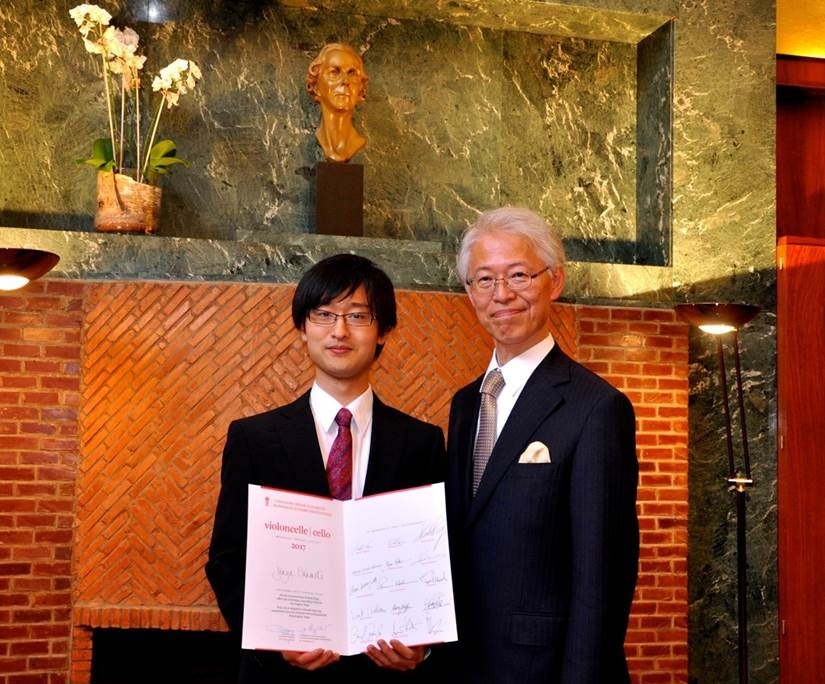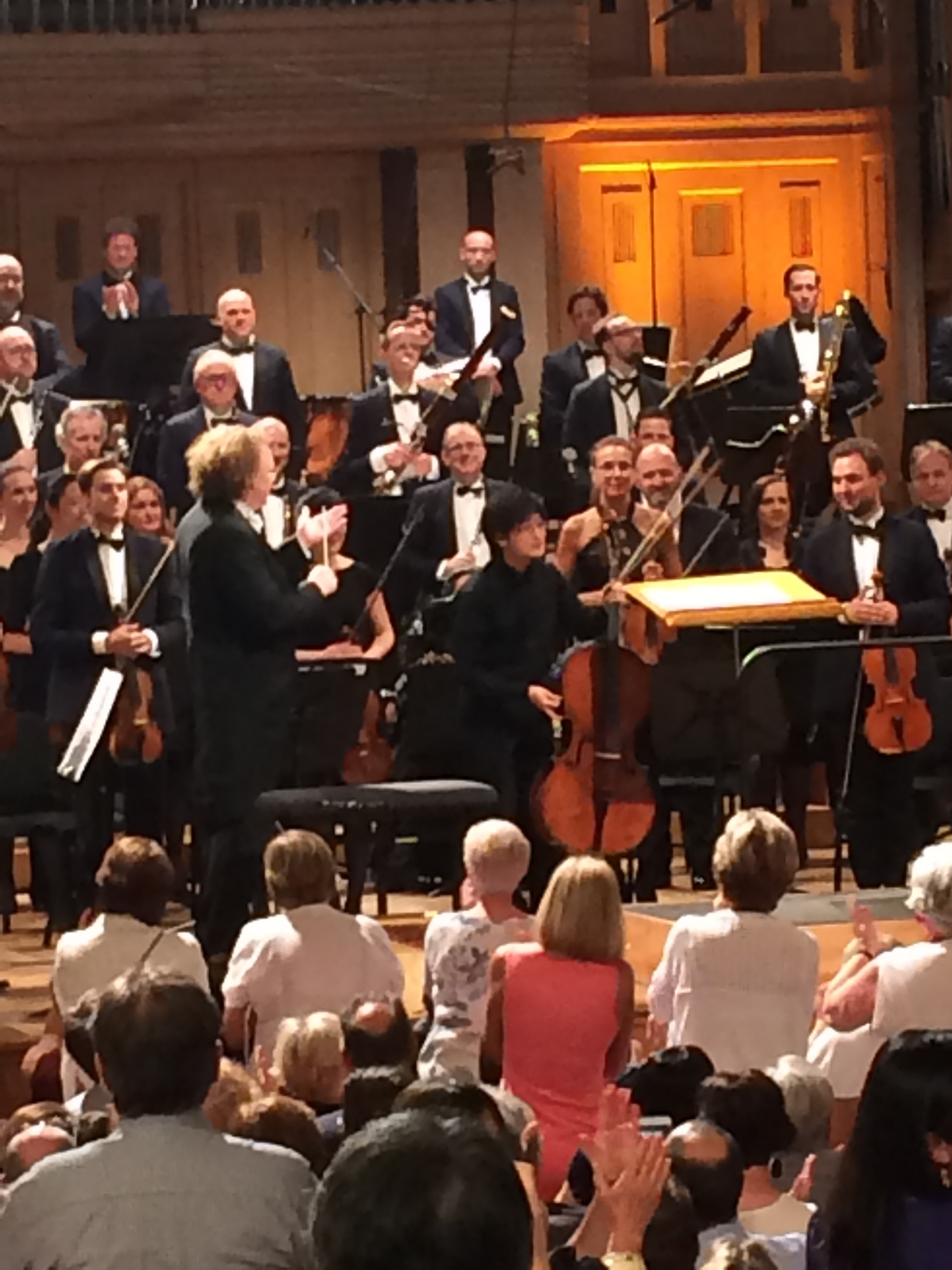Queen Elisabeth Competition (No.2)
 The first recollection I have of the name “Belgium” is when I was still a child and heard about the famous Belgian violinist Arthur Grumiaux. The recordings of Mozart’s violin sonatas which Grumiaux made in the 1950s have been consistently the thing I love most since my childhood. I have listened to it again and again, and it makes me feel happy every time. Even when I listen to it today, it does not feel old to me, thanks to its sweet timbre that is so hard to define, the dignified feeling for composition, the well-balanced tempo and the fresh rhythm. My first experience with Belgium was this, the image that it is a country where people cherish this kind of wonderful music. The first recollection I have of the name “Belgium” is when I was still a child and heard about the famous Belgian violinist Arthur Grumiaux. The recordings of Mozart’s violin sonatas which Grumiaux made in the 1950s have been consistently the thing I love most since my childhood. I have listened to it again and again, and it makes me feel happy every time. Even when I listen to it today, it does not feel old to me, thanks to its sweet timbre that is so hard to define, the dignified feeling for composition, the well-balanced tempo and the fresh rhythm. My first experience with Belgium was this, the image that it is a country where people cherish this kind of wonderful music.
After that, when I was in my third year in university, a surprising yet wonderful piece of news came in from Belgium. It was the news that for the first time a Japanese had won the first prize at the Queen Elisabeth Competition. It was Ms. Yuzuko Horigome who had won the violin competition of 1980. Of course, up until then it was not uncommon for Japanese musicians to perform on the international stage, and some had won top prizes in international competitions. However, winning what is said to be one of the three most prestigious music competitions in the world was a first for a Japanese, so it became a much talked about topic in Japan.
For me, as a music enthusiast, I felt very happy and at the same time amazed by seeing a Japanese of the same generation as mine playing an active role in the international arena. Since it was the time when I was thinking about which path to follow after graduating from university, I feel this was one of the events that strengthened my desire for an international career.
Not long after I arrived in Belgium, the 2017 Queen Elisabeth Competition started on May 8. This year, for the first time in the competition’s long history, the cello has been featured as a solo instrument. After a selection which lasted until June 3, a French cellist, Mr. Victor Julien-Laferrière, was announced as the winner of this year’s competition, followed by a Japanese cellist, Mr. Yuya Okamoto, who took home the second prize.
For me, it was an opportunity to experience the Queen Elisabeth Competition from close by. In addition to experiencing the atmosphere surrounding the competition, I met with the people who are actually supporting the competition. In my contacts with those people as well as the contestants challenging the competition, I felt there were a lot of things I had not noticed before. Below I would like to elaborate on 4 aspects.
 First of all, I was surprised by how much interest the Belgians have for the competition. During the competition, the Queen Elisabeth Competition became a popular topic of conversation everywhere in Brussels. I think the competition is loved not only by classical music enthusiasts, but much more broadly, by many citizens of Brussels or, possibly, by many people in Belgium. First of all, I was surprised by how much interest the Belgians have for the competition. During the competition, the Queen Elisabeth Competition became a popular topic of conversation everywhere in Brussels. I think the competition is loved not only by classical music enthusiasts, but much more broadly, by many citizens of Brussels or, possibly, by many people in Belgium.
Especially since May 20, when the 12 finalists were announced, the reports in the mass media as well as on the internet were extensive. In the Belgian newspapers, pictures of the twelve finalists and their career as well as their personalities were introduced in detail. Furthermore, from May 29 onwards, the finals performed every evening by two finalists were broadcasted live from the venue in primetime on TV and radio. The next morning’s newspapers devoted a full page to the coverage and analysis of the final concerts.
Outside of Belgium, it seems difficult to realize that in today’s society a classical music competition could attract such a broad interest. What would be at the core of this interest? I think it might be because Belgians find a particular significance in discovering the next generation’s new talent in Belgium for the good of the world.
Second of all, I was surprised by the strong enthusiasm of the Belgian people who are actually supporting the competition.
Like most cultural events, the Queen Elisabeth Competition cannot exist without the cooperation of supporters. It goes without saying that one way of supporting is through donations from either private persons or companies.
In addition, another way of cooperation in this competition is the host family system. The competition is firmly supported by host families who voluntarily offer assistance by accommodating the participating young musicians in their home and/or by providing them a space to practice and an accompanying piano. Although it is called “offering one’s house”, it cannot be taken lightly as the competition can continue for a long time when the musician stays in the running.
I had the opportunity to talk often with one such host family member who accepted a Japanese contestant. At the concert venue, the person said "How was it, it was good, right?” And when afterwards the result was not good, the person said "He was lost by a hair’s breadth, what a pity. Just a little better and it would have been a victory.” It was indeed the kind of affectionate attitude of a parent whose own child is performing on stage. Also, the day before the contestant returned to his home country, the host family invited friends over for a home concert, which was a heartwarming arrangement for encouraging the leaving contestant.
Thirdly, I must talk about how intense the competition was. The competition was a rigorous process in which over the course of three selection rounds the results were announced.
In the first round, 69 participants, who had been selected from 202 candidates based on the videos they submitted, performed representative works of the 18th, 19th and 20th century for cello. One’s ability to perform a wide range of works was put to the test, as opposed to for example the International Chopin Piano Competition, which challenges only the ability to play works by Chopin.
The semi-finals became even more severe. The contestants, narrowed down to 24 people, performed a concerto with the orchestra and had to prepare two recital programs including Bach's unaccompanied cello suite and a new work by a Belgian contemporary composer. Just before their performance, the jury instructed which program to play. The ability to cope with a wide range of genres such as concertos, compositions with piano accompaniment and unaccompanied compositions, as well as the comprehension of 21st century music was tested.
In the finals, the number of finalists narrowed further down to 12 and the contestants performed 2 works, backed by a full orchestra. They performed a world premiere composition commissioned for the competition as well as one concerto of their choice. This year's new work was "Sublimation" for orchestra and solo cello by Toshio Hosokawa, a contemporary Japanese composer who has earned high acclaim in Belgium as well. By the way, the 12 finalists, among whom 2 were women, came from 8 different countries, so I sense that the competition also took consideration for diversity.
When faced with a task as hard as this, contestants need to exhaust all that they had in terms of skills and musicality. With a superficial technique or a hasty practice, it is by no means possible to receive a good evaluation.
Fourthly, this year's Queen Elisabeth Competition dedicated in this way nearly a month's time and a lot of goodwill and passion, but as the name of the competition shows, there is a strong backup of the Belgian Royal Family. This, more than anything, was apparent by the fact that Her Majesty Queen Mathilde herself attended the competition frequently.
On June 6, in Waterloo, on the outskirts of Brussels, an award providing ceremony was held in the presence of Her Majesty. After the ceremony, some participants moved to a separate room where she talked closely with each prize-winner, host family and the Ambassador of participating country. She also praised each prize- winner's strenuous efforts. On this moment only, the prize-winners, who made truly outstanding performances on stage, returned to being ordinary young people in their twenties. It was very impressive to find their youthful smiling faces while they were exchanging words with Her Majesty the Queen.
I sincerely hope that the young men and women, who showed their outstanding talent by challenging this tough competition, will be able to make their talent bloom even further, and I do hope that they will be successful on the international stage.
|